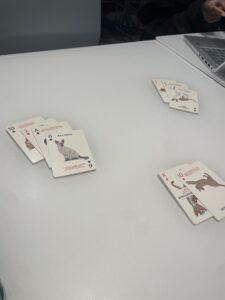Blackjack is a classic casino game, where players try to get a hand closer to 21 than the dealer’s hand, without going over 21. I played as dealer with a small ground of friends. Blackjack, like other casino games, can pose a risk for addiction due to its combination of chance, skill, and other psychological factors. Moreover, the illusion of control is furthered through the engagement with probability, through near misses.
Since the core interaction loop for Blackjack is so short, it creates a quick feedback loop that can lead to continuous play because of the fluctuation of emotions. Each round of Blackjack consists of flipping two to four cards per player that give immediate results, feeding into the anticipation of a win. Throughout the game, my friends varied from excitement (“Ooo dealer bust!”) to disappointment (“Damn that’s tragic”) based on their results from each round. Players would get these results within a minute of playing. Even when they busted after hitting, they would just ask for another round to make up for their loss. These rapid changes in emotions can lead to addictive behavior, because players can quicky move on from their negative emotions from losses. This pace is like slot machines, as each interaction loop is also high speed, giving rapid results as well.
Moreover, near misses enhances the sense of control and involvement in the game. There is the temptation to keep hitting to get closer to 21, even if a third of the deck is composed of 10’s. One time my friend got 20 and chose to stand but I, as dealer, got blackjack. This was my third time getting 20 or 21 in a row. After that, my friend would hit anytime they got under 17. When she already had seventeen but still hit, my other friend who had played in casinos before called them out when they busted. They said, “You play wrong you get shot. ‘Cuz that would’ve gone to the dealer.” Even so, she kept hitting anytime she was below 17. Some, like my friend who called her out, may call this bad skill, but it was that she still had hope that she would get closer to 21, especially after I got most of the 10’s.

With busting or losing, you can calculate how close you were to 21 or from the dealer’s hand. This eliminates the aspect of randomness in the mind and allows you engage more with probability, motivating the players to stay at the table longer. These near misses are compelling because they frame losses into potential wins. Slot machines do this as well, by showing a jackpot either right above or below the current results on the reels. These near misses in slot machines increase the chances that the player will continue engaging with the machine.
Furthermore, players in Blackjack associate wins with skill and losses with luck, catering to the psychological motivation of competence. Unlike pure chance games, Blackjack involves decisions like hitting, standing, and doubling down, giving players the illusion of control. This perceived control can lead to overconfidence and excessive play, as players believe they can influence the outcome through skill. Throughout the game, when my friends busted, they would say “that’s tragic” or “that’s depressing,” blaming their loss on the cards. Whereas when they won, they said, “Yo, you got blackjack!” or “I finally won!” taking responsibility from their wins through the association with identity (“I” and “you”). By using chance to detach from losses and relating wins with skill, players inflate their competence in the game which incentivizes them to play for longer. In other words, they associate bad luck with randomness and wins with logic and strategic thinking using probability. This is like poker with the combination of chance and skill. In poker, players can also blame luck for losses and skill for wins. Unlike blackjack though, poker players also use psychological skills like bluffing and emotional control to contribute to the outcome of the game, which would cater more to the motivation of competence. By creating the illusion of control, Blackjack distracts from the unbalanced aspect of the game. Since the dealer acts last and automatically wins when the players bust, the game is skewed in the favor of the dealer. However, by designing the game to allow the players to inflate their competence, players continue to play at the table regardless.
In short, because of its fast interaction loops with immediate rewards, illusion of control in creating competence, and engagement with probability through near misses, blackjack easily puts people at risk for addiction.



